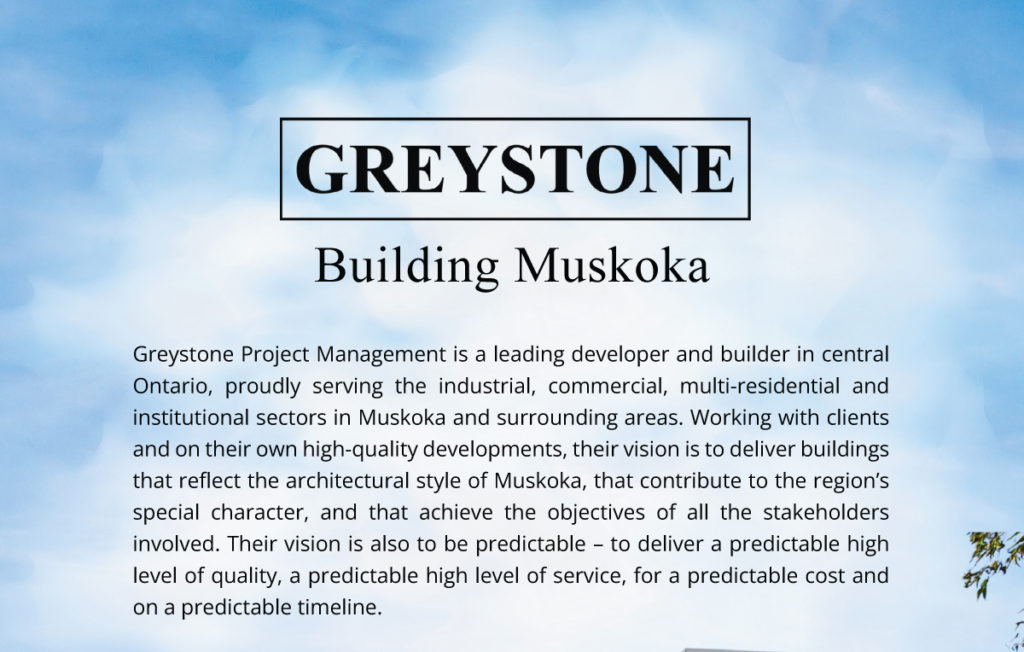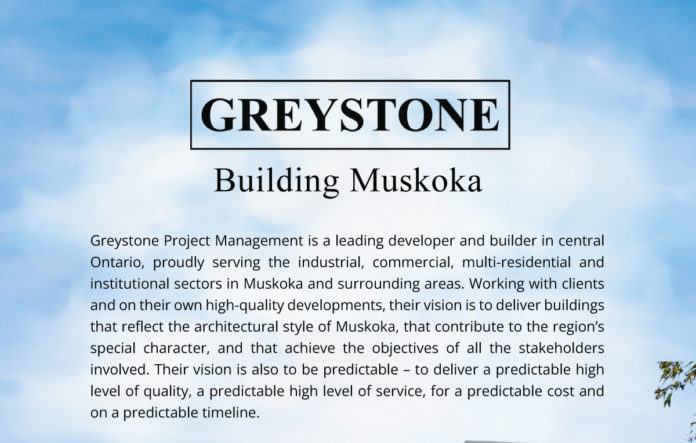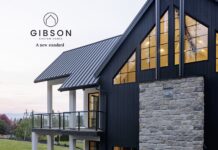
Click here to view the brochure.
Building Muskoka
Greystone Project Management is a leading developer and builder in Central Ontario, proudly serving the industrial, commercial, multi-residential and institutional sectors in Muskoka and surrounding areas. Their vision is to deliver buildings that reflect the architectural style of Muskoka, that contribute to the region’s special character, and that achieve the objectives of all the stakeholders involved. Their mission is also to be predictable – which means always delivering superior quality, a high level of service, for a reasonable cost, and on an accurate timeline.
“We deliver quality buildings, premier service, and unrivalled value to our clients beyond expectations on every project,” says Jon Morton, Chief Operating Officer.
“Our vision is to be an industry leader, and to have the capacity, knowledge and experience to provide a level of service that is unparalleled.”
Greystone was first founded in 1995 by Patrick (Pat) Dubé, the company’s president. Jon, for his part, started working with Pat roughly 10 years ago. At the time, Pat was looking to “add a bit more structure” to his growing business, while also someone to help him out with the day-to-day operating of the company so that he could focus more on planning for the future. Jon, like Pat, comes from a background in engineering, which is part of what made him a good fit for the role.
Over the years, Jon has seen Greystone evolve steadily in terms of both size and capability. In particular, he’s seen their projects get a lot larger. The company does a lot of design-build commercial and industrial work, including offices, medical centres, and automotive dealerships. They also focus efforts on large-scale condominium developments and apartment buildings, which they develop, design, and build all in-house. The company also works on significant Design-Build public sector projects, such as fire halls and EMS stations.
According to Jon, when it comes to their external clients, Greystone tends to generate most of their leads through their reputation:
“We get a lot of repeat business, we get a lot of referrals, and a lot of our clients come to us directly,” he explains. “A lot of that is reputation-based. It comes from people having experience with us and the way we do projects.”
“Our approach is very team-oriented,” he says. “We’re not adversarial, and we’re very predictable. We take a design-build approach because that’s what we’re good at, but also because it allows us to give our clients a clear picture of what their final cost will be really early on in the process. That’s what we want to do; we want to give them that clear picture. We want to be predictable. We’re not a fan of playing the change-order game. There are a lot of contractors that make their living that way, but that’s not us.”
As builders with their own in-house development experience, Greystone is also especially equipped to help guide clients through every step of the development process. Along the way, they can provide well-informed suggestions that not only contribute to the aesthetic of the building, but also to the building’s functionality and long-term performance.
“We have team members who have a lot of experience and a lot of knowledge in all aspects of drafting, design, building, and development,” Jon says. “We can make excellent recommendations.”
Again, Greystone is also predictable when it comes to pricing – for clients, the value of that predictability cannot be overstated.
“The best way I can explain it is that we count every stud and every nail when we’re doing our preliminary estimates,” Jon explains. “We put a lot of effort into quantifying everything. Then you can more accurately predict the final cost and there’s less variability.. There are companies that just take per-square-foot-pricing approaches, but that’s not what we do. Everything we can possibly quantify, we quantify. It’s a bit more work up-front, but it results in much better outcomes.”
“Even on a design-build project where we don’t have complete plans, we’re still counting studs as we design it,” he adds. “We’re figuring out what we need to buy, how much of it, and then we’re going to market to find out exactly what it costs – because prices are always changing. This allows us to be extremely cost-competitive and it allows us to keep the pricing realistic because we’re not building in contingencies for risk, which I think is what usually happens.”
“I will admit that these past few years have been more challenging because of price volatility,” he says. “There’s more price volatility than we’ve ever seen. But there are ways to deal with that. If we work with the client in a progressive way through the design and the build, we can make sure their project is achieved at the best possible cost.”
Greystone also strives to achieve the best possibly quality of work, which is another important pillar supporting their industry-leading reputation. Jon credits their success in that arena to their material selection and the emphasis they place on durability and longevity:
“The building has to look good, of course, but it also has to stand the test of time,” he says. “As a company, we’re over 25 years old right now, and there are buildings that we built 15, 20, 25 years ago that still look fantastic. We expect them to still look fantastic after 40 years and beyond.”
Greystone also emphasizes energy-efficiency in their building materials and methods, as they want their buildings to be cost-effective to operate:
“Our buildings can’t cost a lot of money to maintain,” he says. “Our clients tend to be business owners. They need their business to be successful and how their building performs plays a huge part in that. If their building is costly to operate or if it’s failing on them, that can affect their business. So we really try to make good decisions from a design and building technology perspective to ensure the best outcomes for our clients.”
In order to make those good decisions, Greystone strives to stay up-to-date on the latest in building technology.
“We really love building science. We love finding ways to get better, to get more efficient, to provide more value for clients. Every project that goes by, we ask ourselves the same questions. ‘Is this the right approach? Is there a better way to do this? How can we provide better value for our clients?’”
As a testament to the performance of their buildings, Jon cites an automotive dealership they did, where they delivered a building that was twice as large as the client’s previous space – and the owner’s heating bill was “cut in half.”
“It was great to hear. That’s the kind of feedback we love to get. That’s what we aim for,” Jon says.
Greystone also stands behind their work. If there’s ever an issue with a past project, the company doesn’t hestitate to rectify it.
“I’m not going to sit here and say there is never going to be a warranty issue,” Jon says. “This is construction. Things happen. But when they happen, we want those warranty issues to be minor in nature, and we want to deal with them properly. I think that means a lot to our clients.”
“The industry standard is a one-year warranty – some components, of course, carry longer warranties, but the industry standard is one-year. But if we have a client that calls five years later because something is not performing as expected, then we’ll go to them and help them figure it out. We truly stand behind our projects.”
Experience and expertise
Over the years, Greystone Project Management has built up a “pretty significant” team of in-house carpenters, carpenters assistants, other labourers, project managers, and project coordinators. Jon further credits the company’s quality to the strength of that in-house team:
“Putting together a quality build starts with the design, but it’s also important to make the right decisions in the field,” he says. “Our team in the field is amazing.”
“Oftentimes, our team goes beyond what code recommends for waterproofing, for sealing windows, for all these critical components that can be problematic later. They know that if they spend just a little extra time early in the job to properly deal with things like water, moisture, and drainage, they can prevent a lot of problems down the line. Regardless of what the plans say, or what the code might say, they make sure those things are dealt with. They have the expertise and experience to make those decisions in the field at the right times. I think that’s a huge part of why our buildings perform so well.”
The experience part, Jon says, is particularly valuable. He believes the experience of their team is why they are so effective:
“You have to make mistakes in order to learn,” he says. “But we only make those mistakes once, and then we make the change going forward so it never happens again. That’s what makes our team so special. That experience is so important.”
“That can be difficult to explain to clients,” he adds. “It’s not something they see when they are comparing two bids. But when they talk to our references and look at our past projects; I think that’s when they start to understand.”
In addition to their in-house team, Greystone works with a longstanding roster of “amazing sub-trades and suppliers,” according to Shelby Robertson, Project Coordinator.
“We almost always end up working with the same trades,” Shelby explains, “because they know our program and because they just do amazing work. They have the same mentality we do – which is, ‘do it right the first time,’ that way they don’t have to come back and fix it later on. They take a very smart and forward-thinking approach to the work they’re doing.”
“They also provide fair pricing and they’re very cognizant of schedule,” adds Jon. “That’s why they continue to get work from us, and we continue to have success together.”
Some of those relationships with those regular subtrades predate even Jon – some go back over 10 years, a few even go back to the company’s very inception.
“Those partners are a critical component our business,” Jon says. “They’re another key reason we’re able to achieve such good outcomes.”
Community building
When it comes to their own in-house development work, Greystone is currently focusing on low-to-mid-rise multi-residential projects in Central Ontario. Currently, they are invested in Huntsville and Parry Sound, but they are exploring opportunities all over the region. In particular, they are now looking for opportunities to address the local need for affordable housing.
“If we can contribute to providing even a part of the solution for attainable housing, that would great,” Jon says. “We love this community and we’re very involved in the community. We want to help out however we can.”
At the same time, Greystone is also planning future commercial development. Their most recent development is ‘Campus Trails’ in Huntsville – that’s a blended development that includes residential, wellness centres, hiking trails, and more. Greystone has already developed two medical buildings there, and Jon predicts a few more commercial buildings to come, along with more multi-residential buildings in the same area.
As a developer, Jon believes what sets Greystone apart is their approach to client engagement, as well as – once again – their focus on quality.
“We care so much about quality,” he reiterates. “Huntsville is a local small community, and we’re going to be doing many more projects in the future in this region. Every single one has to perform well, or word will get around. If any one project doesn’t perform, it’s going to affect our future sales.”
“We want to build strong communities that people want to be a part of, that integrate well with local transportation networks, that fit with the local community, that are welcomed by the community,” Jon continues. “We want people saying good things and we want people to know we’re doing things the right way.”
“It’s not about maximizing density for us,” he says. “We’re not trying to put in as many units as possible. We’re trying to create places that are very enjoyable to live.”
Campus Trails, Jon says, is a prime example of such a place. Residents have access to walking and biking trails, community gardens, as well as variety of wellness services such as physicians, physiotherapy, and a pharmacy, as well as plans for a pickle ball court in the future as part of the development. Prices for the first condo building there (called The Tom) were reasonable, with suites starting below the average selling price of a home in Huntsville. Those are qualities Greystone aims to replicate in their future projects.
“With Greystone, buyers should have confidence that the building’s going to be completed, that it’s going to be well built, and that condo fees are going to be reasonable because there’s not going to be a lot of maintenance,” Jon says.
“We’re not looking for the cheapest way to build a building,” he says in summation. “We’re looking for the most practical way to get a building built in a reasonable time frame at the highest possible quality.”
Moving forward, Greystone’s goal is to continue delivering that quality – both in their own developments, as well as in for their work for clients.
“We want to stay diverse,” Jon concludes. “We love taking on different challenges and doing different kinds of projects. Working for clients also allows us to contribute to the community in different ways than we can as a developer. If we can deliver a facility that works well and that serves the community well for decades to come – then that’s something we can be proud of.”
For more on Greystone Project Management, their range of services and capabilities, and more examples of past projects, visit https://www.greystoneconstruction.ca/For more on Campus Trails in Huntsville, in particular, visit https://www.campustrailshuntsville.ca/









